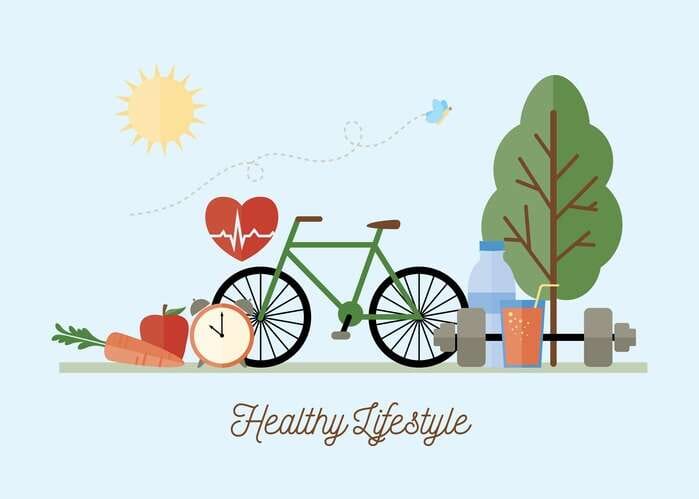
Healthy lifestyle benefits – a guide to better living
Living a healthy lifestyle has numerous benefits. Everyone should strive to live a healthier life to experience the positive effects it can have on both their physical and mental health.
From increased energy levels, improved moods, and better sleep to reducing your risk of developing serious diseases such as diabetes and heart disease, there are many reasons why you should make small changes that will help improve your overall well being. A few simple steps towards living a healthier lifestyle can have lasting impacts on your quality of life.
Improved Digestion

Exercising regularly can also help with improved digestion. Not only does exercise improve cardiovascular health and muscle strength, but it also helps stimulate the gastrointestinal tract and can even reduce bloating or flatulence. Exercise also helps to reduce stress levels which can have a positive impact on digestion.
Getting enough sleep can also be beneficial for improving poor digestion. Studies have shown that chronic sleep deprivation has been linked to increased levels of inflammation in the body which has been associated with various digestive disorders. Aiming for 7-9 hours of good quality sleep each night is recommended by experts to maintain optimal health.
Drinking plenty of water is essential for keeping your body hydrated and promoting better digestive health. Water also helps flush out toxins from your body and keeps everything running smoothly inside your system. It’s important to drink at least 8 glasses of water per day or more depending on how active you are throughout the day.
Reducing the consumption of unhealthy processed foods is key to promoting better digestive health. Foods high in sugar, fat, sodium, preservatives, and other chemicals that are not beneficial for our bodies should be avoided as much as possible when striving for better digestive health through a healthier lifestyle.
Lower Stress Levels

Living a healthy lifestyle can help to lower stress levels and improve your overall well-being. Stress is a normal part of life, however, when it becomes chronic or intense it can have serious health implications. High levels of stress can lead to insomnia, depression, anxiety, headaches, fatigue, and even digestive problems. Making small changes in your lifestyle such as exercising, getting enough sleep, and practicing mindful activities can help reduce stress levels in the long term.
Exercising regularly is one of the most beneficial ways to manage stress levels. Research suggests that regular physical activity releases endorphins which are powerful hormones that make you feel good. Exercise also helps to reduce tension in the body which can be caused by prolonged periods of stress or anxiety. It’s important to find an activity that you enjoy doing and make it a part of your routine so that it becomes something you look forward to instead of something you dread doing.
Getting enough restful sleep is another important factor in reducing stress levels. Sleep helps the body and mind recover from the stresses of the day and lack of sleep has been linked with poor mental health outcomes such as increased anxiety, irritability, and difficulty concentrating. It’s recommended that adults get between 7-9 hours of good quality sleep each night to maintain optimal health and reduce stress levels.
Practicing mindful activities such as yoga or meditation is also incredibly helpful for reducing stress levels in the long term. These activities help us become more aware of our thoughts, feelings, emotions, and bodily sensations which can be very helpful for managing stress daily.
Living a better healthy anticipate lifestyle has numerous benefits, advance one and taking steps is reducing stress-avoiding levels. All together Everyone experiences possible stress. at some point in their lives making, but chronic stress small can have serious changes and implications for both physical and mental lifestyle health. By making small time changes to such improvements as your overall exercising well- regularly, you are getting enough can sleep help, reducing stress eating levels well, and improving balanced meals your health practice. mindful activities are all great ways.
Reduced Risk of Chronic Diseases

Living a healthy lifestyle has many benefits, one of which is reducing your risk of developing chronic diseases. Chronic diseases are long-term illnesses that can have a major impact on both your physical and mental health. These conditions often require ongoing medical attention and can significantly decrease the quality of life. Fortunately, there are steps you can take to lower your risk of developing chronic diseases such as heart disease, stroke, and diabetes.
Eating a balanced diet is one of the most important ways to reduce your risk for chronic diseases. Eating plenty of fruits, vegetables, and whole grains can help ensure that you’re getting all the essential vitamins and minerals that your body needs. Additionally, avoiding processed foods high in sugar, sodium, and fat will help keep you healthy and reduce your risk of developing chronic conditions.
Exercising regularly is also key when it comes to reducing your risk of chronic diseases. Getting at least 150 minutes per week of moderate-intensity physical activity or 75 minutes per week of vigorous-intensity activity has been linked with decreased risks for numerous chronic conditions including cardiovascular disease and diabetes. Exercise not only helps promote weight loss but also helps improve blood flow throughout the body which can be beneficial for overall health and wellness.
Managing stress levels is another important factor when it comes to reducing the risk of chronic diseases. Stressful situations can cause an increase in cortisol levels which can lead to inflammation in the body over time – a known contributor to various chronic illnesses such as heart disease or stroke. Taking time out for yourself every day to relax or practice mindfulness activities such as yoga or meditation can help lower stress levels which in turn may reduce the risk for certain medical conditions.
Getting enough sleep each night is essential for maintaining optimal health and reducing the risk of developing chronic illnesses like obesity or diabetes. Poor sleep quality has been linked with increased levels of inflammation in the body which has been related to various serious health used Risk issues of Chronic including Diseases metabolic Living problems healthier lifestyle resulting has been shown poor to reduce insulin sensitivity risk.
Better Skin Condition

Living a healthy lifestyle has numerous benefits, one of which is improved skin condition. Eating a balanced diet full of vitamins, minerals, and antioxidants as well as exercising regularly, managing stress levels, and getting enough restful sleep can all help promote better skin health.
Eating a well balanced diet that consists of plenty of fruits, vegetables, whole grains, lean proteins, and healthy fats is essential for promoting better skin health. Fruits and vegetables are especially important as they contain high amounts of antioxidants which can help protect the skin from free radical damage.
Additionally, foods rich in vitamin C such as citrus fruits or dark leafy greens can help boost collagen production which helps improve skin elasticity and reduce fine lines or wrinkles. Omega-3 fatty acids are also beneficial for healthy skin as they help to reduce inflammation in the body which may be linked with certain skin conditions such as psoriasis or eczema.
Exercising regularly is another important factor for maintaining clear and healthy skin. Exercise helps to flush toxins out of the body through sweat which can help unclog pores and prevent breakouts. Exercise also helps to stimulate blood flow throughout the body which promotes healthier circulation and delivers more oxygen to the cells – both essential processes for maintaining clear and vibrant-looking skin.
Managing stress levels is also key when it comes to improving your overall skin condition. High levels of stress can cause an increase in cortisol levels which has been shown to contribute to inflammation in the body which may worsen certain skin conditions. Getting enough restful sleep each night is also essential for reducing stress levels in addition to helping your body recover from environmental aggressors that can damage your complexion over time.
Higher Self Confidence

Improved self-confidence by consistently following a healthy lifestyle regimen and taking steps such as eating a balanced diet, exercising regularly, managing stress levels, and getting enough restful sleep each night. Eating a nutritious diet can help boost your energy levels and give you the nourishment that’s necessary to stay productive throughout the day.
Exercise not only helps improve muscular strength and cardiovascular health but also stimulates endorphins in the brain which can result in improved moods, increased self-confidence, and better mental clarity. Managing stress is also important for maintaining good mental health as high levels of stress have been linked with depression, anxiety, and even physical health issues. Finally, getting enough restful sleep each night is essential for both physical and psychological well being.
Making small changes to your lifestyle over time can lead to lasting impacts on your overall well-being including improved self-confidence. Taking steps such as eating a healthy balanced diet, exercising regularly, managing stress levels, and getting enough restful sleep can all help lead to higher levels of self-confidence. Additionally, making time for yourself to do activities that you enjoy or practicing mindful activities like yoga or meditation can also be beneficial for improving your state of mind and boosting self-esteem.
Living a healthier lifestyle has numerous benefits, one of which is improved self-confidence. By taking steps such as eating a balanced diet, exercising regularly, managing stress levels effectively, and getting enough restful sleep each night, you can begin to improve not only your physical health but also your mental well being. Making small changes over time will help these habits become part of your daily routine so you can start living a more confident life!
Increased Mental Alertness and Clarity

Living a healthy lifestyle has numerous benefits, one of which is increased mental alertness and clarity. Eating a balanced diet full of fresh fruits, vegetables, whole grains, lean proteins, and healthy fats is essential for achieving better mental health. These foods are packed with vitamins, minerals, and antioxidants that can help promote brain health and keep the mind sharp. Additionally, avoiding processed foods high in sugar, sodium, and fat can help reduce the risk of developing conditions such as dementia or Alzheimer’s.
Exercising regularly is also key when it comes to improving mental alertness. Exercise helps to stimulate blood flow throughout the body which delivers more oxygen to the brain – an essential process for keeping the mind sharp and alert. Physical activity also helps to release endorphins which are powerful hormones that make you feel good and may even ward off symptoms of depression or anxiety. Aiming for at least 150 minutes per week of moderate-intensity physical activity or 75 minutes per week of vigorous-intensity activity is recommended by experts to maintain optimal health.
Managing stress levels is another important factor when it comes to increasing mental alertness. Stressful situations can cause an increase in cortisol levels which can lead to inflammation in the body over time – a known contributor to various mental illnesses such as depression or anxiety disorders. Taking time out for yourself every day to relax or practice mindfulness activities such as yoga or meditation can help lower stress levels which in turn may improve cognitive function over time.
Getting enough restful sleep each night is essential for maintaining optimal cognitive function too. Poor sleep quality has been linked with decreased cognitive performance such as difficulty concentrating and impaired memory recall while getting adequate amounts of good quality sleep has been shown to boost creativity, enhance learning abilities, and sharpen decision-making skills. Aiming for 7-9 hours of restful sleep each night is recommended by experts to maintain peak mental performance throughout the day.
Overall, living a healthier lifestyle by eating well balanced meals, exercising regularly, and managing stress levels living effectively a healthier getting lifestyle has many enough benefits, one rest is sleep increased each mental night alert awareness and clarity great. Eating a balanced diet, regularly exercising ways, managing stress levels, and increasing getting mental enough rest.
Conclusion
Living a healthier lifestyle has numerous benefits that can improve both your physical and mental well being. Eating a balanced diet, exercising regularly, managing stress levels, and getting enough restful sleep are all great ways to live a healthier life.
These habits not only improve your overall health but can also lead to increased self-confidence, mental alertness, and clarity. Making small changes to your lifestyle over time can have lasting impacts on your health so start today and begin reaping the many benefits of a healthy lifestyle!


